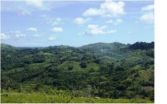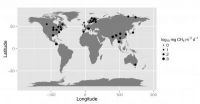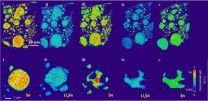(Press-News.org) Ottawa (March 27, 2014) – A new expert panel report on food security in Northern Canada, has found that food insecurity among northern Aboriginal peoples requires urgent attention in order to mitigate impacts on health and well-being. Aboriginal Food Security in Northern Canada: An Assessment of the State of Knowledge, released today by the Council of Canadian Academies, addresses the diversity of experience that northern First Nations, Inuit, and Métis households and communities have with food insecurity.
Aboriginal households across Canada experience food insecurity at a rate more than double that of non-Aboriginal households (27% vs. 12%, respectively). Recent data indicate that Canadian households with children have a higher prevalence of food insecurity than households without children. A 2007-2008 survey indicated that nearly 70% of Inuit preschoolers aged three to five lived in food insecure households, and 56% lived in households with child-specific food insecurity. Preliminary evidence also indicates that more women than men are affected. The Panel concluded that lasting solutions require collaboration and the continued involvement of those most affected by food insecurity: people living in the North.
"To fully understand the issue of food security, consideration must be given to the many factors that influence life in the North, such as environmental change, culture, governance, and economies," said Dr. Harriet Kuhnlein, Chair of the Expert Panel. There are no silver-bullet solutions — that is why cooperation among all the key actors including local communities, governments, businesses and institutions is essential.
The evidence-based report provides data on the various rates of food insecurity, explores how different factors affect food security, and describes the health and social effects of rapid social, environmental, and economic transitions — including the nutrition transition. Other findings include:
There is no single way to "solve" food security issues in the North. A range of holistic approaches, including poverty reduction strategies, is required.
There exists a strong body of research and traditional knowledge with respect to food security and northern Aboriginal health, but several knowledge gaps persist.
The food security measurement methods used to date have been valuable, but their ability to respond to the complex issue of food security in the northern Canadian Aboriginal context is limited.
Geographic, cultural, environmental, and economic diversity necessitates programs and policies that are responsive to locally-identified needs and are enabled by traditional knowledge and community strengths. Northern communities are a key source of resilience and innovative ideas.
"At the forefront of the panel's discussions were the people who are most affected by food insecurity. This expert panel was committed to conducting an assessment that fully considered the complex range of issues that are a daily reality for northern communities and have significant implications for food security," said Elizabeth Dowdeswell, President of the Council of Canadian Academies." The panel's report provides clear evidence and insights that can assist in building effective solutions for both the short and long-term."
INFORMATION:
For more information or to download a copy of the Panel's report, visit the Council of Canadian Academies' website, http://www.scienceadvice.ca.
About the Council of Canadian Academies
The Council of Canadian Academies is an independent, not-for-profit organization that began operation in 2005. The Council supports evidence-based, expert assessments to inform public policy development in Canada. Assessments are conducted by independent, multidisciplinary panels of experts from across Canada and abroad. The Council's blue-ribbon panels serve free of charge and many are Fellows of the Council's Member Academies: the Royal Society of Canada; the Canadian Academy of Engineering; and the Canadian Academy of Health Sciences. The Council's vision is to be a trusted voice for science in the public interest. For more information visit http://www.scienceadvice.ca
For more information please contact:
Cathleen Meechan
Director, Communications
Council of Canadian Academies
613.567.5000 x 228
cathleen.meechan@scienceadvice.ca
Food insecurity a growing challenge in Canada's northern and remote Aboriginal communities
Expert panel report on the state of knowledge of food security in northern Canada
2014-03-27
ELSE PRESS RELEASES FROM THIS DATE:
Computing with slime
2014-03-27
Oxford, March 27, 2014 - A future computer might be a lot slimier than the solid silicon devices we have today. In a study published in the journal Materials Today, European researchers reveal details of logic units built using living slime molds, which might act as the building blocks for computing devices and sensors.
Andrew Adamatzky (University of the West of England, Bristol, UK) and Theresa Schubert (Bauhaus-University Weimar, Germany) have constructed logical circuits that exploit networks of interconnected slime mold tubes to process information.
One is more ...
Study finds gaming augments players' social lives
2014-03-27
New research finds that online social behavior isn't replacing offline social behavior in the gaming community. Instead, online gaming is expanding players' social lives. The study was done by researchers at North Carolina State University, York University and the University of Ontario Institute of Technology.
"Gamers aren't the antisocial basement-dwellers we see in pop culture stereotypes, they're highly social people," says Dr. Nick Taylor, an assistant professor of communication at NC State and lead author of a paper on the study. "This won't be a surprise to the ...
People unwilling to swallow soda tax, size restrictions
2014-03-27
ITHACA, N.Y. – Those hoping to dilute Americans' taste for soda, energy drinks, sweetened tea, and other sugary beverages should take their quest to school lunchrooms rather than legislative chambers, according to a recent study by media and health policy experts.
Soda taxes and beverage portion size restrictions were unpalatable to the 1,319 U.S. adults questioned in a fall 2012 survey as part of a study reported online this month in the journal Preventive Medicine.
Adding front-of-package nutrition labels and removing sugary beverages from school environments garnered ...
Agroforestry systems can repair degraded watersheds
2014-03-27
NAIROBI, Kenya. (27 March 2014) ----Agroforestry, combined with land and water management practices that increase agricultural productivity, can save watersheds from degradation.
A study conducted by the World Agroforestry Centre (ICRAF) in the Gabayan watershed in eastern Bohol, Philippines, has shown that agroforestry systems create a more sustainably managed watershed that allows people living there to benefit from the ecosystem. The benefits include higher crop yields, increased income and resilience to climate change.
Agroforestry is an integrated land-use management ...
Scientists watch nanoparticles grow
2014-03-27
This news release is available in German. With DESY's X-ray light source PETRA III, Danish scientists observed the growth of nanoparticles live. The study shows how tungsten oxide nanoparticles are forming from solution. These particles are used for example for smart windows, which become opaque at the flick of a switch, and they are also used in particular solar cells. The team around lead author Dr. Dipankar Saha from Århus University present their observations in the scientific journal Angewandte Chemie – International Edition.
For their investigation, the scientists ...
Record quantum entanglement of multiple dimensions
2014-03-27
The states in which elementary particles, such as photons, can be found have properties which are beyond common sense. Superpositions are produced, such as the possibility of being in two places at once, which defies intuition. In addition, when two particles are entangled a connection is generated: measuring the state of one (whether they are in one place or another, or spinning one way or another, for example) affects the state of the other particle instantly, no matter how far away from each other they are.
Scientists have spent years combining both properties to construct ...
A more potent greenhouse gas than CO2, methane emissions will leap as Earth warms
2014-03-27
While carbon dioxide is typically painted as the bad boy of greenhouse gases, methane is roughly 30 times more potent as a heat-trapping gas. New research in the journal Nature indicates that for each degree that the Earth's temperature rises, the amount of methane entering the atmosphere from microorganisms dwelling in lake sediment and freshwater wetlands — the primary sources of the gas — will increase several times. As temperatures rise, the relative increase of methane emissions will outpace that of carbon dioxide from these sources, the researchers report.
The findings ...
Researchers reveal the dynamics behind Arctic ecosystems
2014-03-27
Field studies covering three continents show that temperature has an unexpectedly important effect on food-web structure, while the relationship between predator and prey is crucial for the food-web dynamics and thereby the entire ecosystem.
Temperature is decisive
'We have gathered data on all animals and plants characterising the arctic tundra in seven different areas. This has allowed us to generate a picture of how food chains vary over a very large geographical (and, with it, climatic) gradient. Therefore, and for the first time, we can offer an explanation of ...
IRCM researchers uncover a new function for an important player in the immune response
2014-03-27
Montréal, March 27, 2014 – IRCM researchers led by Javier M. Di Noia, PhD, uncovered a new function of AID, a crucial enzyme for the immune response. The discovery, recently published by the scientific journal Proceedings of the National Academy of Sciences (PNAS), helps explain a rare genetic disorder that causes an immunodeficiency syndrome.
The Montréal research team studies the enzyme AID, or activation-induced deaminase, that can be found in B lymphocytes (the group of white blood cells whose main function is to produce antibodies to fight against infections). AID ...
Scientists track 3-D nanoscale changes in rechargeable battery material during operation
2014-03-27
UPTON, NY-Scientists at the U.S. Department of Energy's Brookhaven National Laboratory have made the first 3D observations of how the structure of a lithium-ion battery anode evolves at the nanoscale in a real battery cell as it discharges and recharges. The details of this research, described in a paper published in Angewandte Chemie, could point to new ways to engineer battery materials to increase the capacity and lifetime of rechargeable batteries.
"This work offers a direct way to look inside the electrochemical reaction of batteries at the nanoscale to better understand ...
LAST 30 PRESS RELEASES:
$3 million NIH grant funds national study of Medicare Advantage’s benefit expansion into social supports
Amplified Sciences achieves CAP accreditation for cutting-edge diagnostic lab
Fred Hutch announces 12 recipients of the annual Harold M. Weintraub Graduate Student Award
Native forest litter helps rebuild soil life in post-mining landscapes
Mountain soils in arid regions may emit more greenhouse gas as climate shifts, new study finds
Pairing biochar with other soil amendments could unlock stronger gains in soil health
Why do we get a skip in our step when we’re happy? Thank dopamine
UC Irvine scientists uncover cellular mechanism behind muscle repair
Platform to map living brain noninvasively takes next big step
Stress-testing the Cascadia Subduction Zone reveals variability that could impact how earthquakes spread
We may be underestimating the true carbon cost of northern wildfires
Blood test predicts which bladder cancer patients may safely skip surgery
Kennesaw State's Vijay Anand honored as National Academy of Inventors Senior Member
Recovery from whaling reveals the role of age in Humpback reproduction
Can the canny tick help prevent disease like MS and cancer?
Newcomer children show lower rates of emergency department use for non‑urgent conditions, study finds
Cognitive and neuropsychiatric function in former American football players
From trash to climate tech: rubber gloves find new life as carbon capturers materials
A step towards needed treatments for hantaviruses in new molecular map
Boys are more motivated, while girls are more compassionate?
Study identifies opposing roles for IL6 and IL6R in long-term mortality
AI accurately spots medical disorder from privacy-conscious hand images
Transient Pauli blocking for broadband ultrafast optical switching
Political polarization can spur CO2 emissions, stymie climate action
Researchers develop new strategy for improving inverted perovskite solar cells
Yes! The role of YAP and CTGF as potential therapeutic targets for preventing severe liver disease
Pancreatic cancer may begin hiding from the immune system earlier than we thought
Robotic wing inspired by nature delivers leap in underwater stability
A clinical reveals that aniridia causes a progressive loss of corneal sensitivity
Fossil amber reveals the secret lives of Cretaceous ants
[Press-News.org] Food insecurity a growing challenge in Canada's northern and remote Aboriginal communitiesExpert panel report on the state of knowledge of food security in northern Canada




